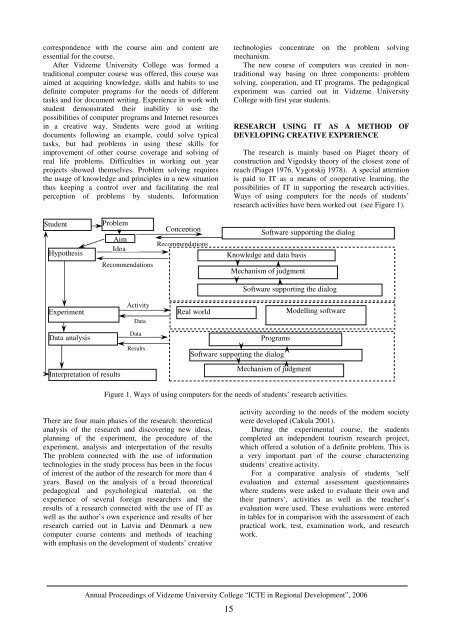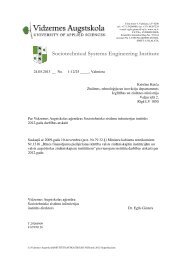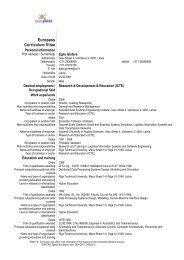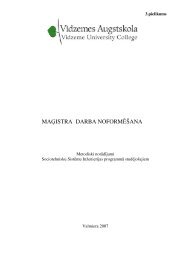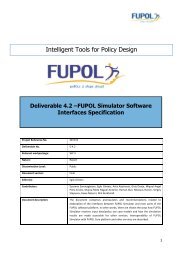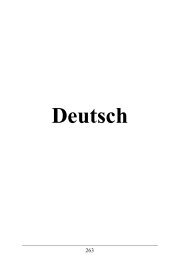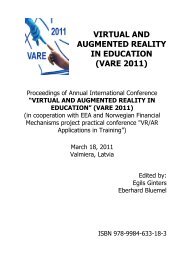<strong>in</strong><strong>format</strong>ion accord<strong>in</strong>g to the level of the student andsecond to help the student to ga<strong>in</strong>, select and organize<strong>in</strong><strong>format</strong>ion. Each <strong>in</strong>dividual has a different perception;hence, learn<strong>in</strong>g is an <strong>in</strong>dividual process, form<strong>in</strong>g<strong>in</strong>dividual experience.The quality of teach<strong>in</strong>g <strong>in</strong>fluences the quality oflearn<strong>in</strong>g and thus the teach<strong>in</strong>g rema<strong>in</strong>s important.Qualitative education conta<strong>in</strong>s full time education,distance education, learner responsibility, educatorresponsibility, and adm<strong>in</strong>istrative responsibility.Computer managed learn<strong>in</strong>g as an aid to <strong>format</strong>iveassessment <strong>in</strong> higher education, focuses on an advantagesprovided by computer managed learn<strong>in</strong>g systems thatprovide assessment and student track<strong>in</strong>g functions(Zellner 2003). Fundamental knowledge is com<strong>in</strong>g to be<strong>in</strong>creas<strong>in</strong>gly important <strong>in</strong> the tra<strong>in</strong><strong>in</strong>g of graduates for arather broad field of future professional activity.In<strong>format</strong>ion technology has revolutionized education <strong>in</strong>terms of how we organize, structure, and empowers ourdaily education practice. S<strong>in</strong>ce networkedcommunication came <strong>in</strong>to be<strong>in</strong>g, it has affected the waywe teach and learn. The use of technology now has notonly <strong>in</strong>creased <strong>in</strong> the classroom, but also homes,libraries, coffee shops and other places throughout ournation’s communities. E-learn<strong>in</strong>g and distance educationprograms have spread, while the opportunities for us<strong>in</strong>gthem have <strong>in</strong>creased.The productivity of the study process is determ<strong>in</strong>ed bythe goal of the student <strong>in</strong> the study process, cooperation,the level of master<strong>in</strong>g knowledge and skills translated<strong>in</strong>to the results of studies The levels of knowledgecharacterize the quality of knowledge with the help ofsuch characterizes as breadth and depth, systematicalcharacter, system, stability, operational characteristics(Cakula 2005).It is a pedagogical problem to make more optimal theproportion <strong>in</strong> the cognition process between the readymade knowledge and knowledge achieved by the studenthim/herself.Experience is always necessary for <strong>in</strong>tellectualdevelopment, although it is not sufficient to only free thestructures <strong>in</strong>volved <strong>in</strong> experience. It is important for thestudent to be active, be able to transform th<strong>in</strong>gs and f<strong>in</strong>dhis/her own activity concern<strong>in</strong>g the object. Essentiallyimportant is the structure and organization of the studyunit, a better succession of the tasks and experiences.There exists a feedback concern<strong>in</strong>g the student’s progresson each phase, unit, or task; an idea of alternativelearn<strong>in</strong>g and tasks is be<strong>in</strong>g formed. The assessment hasformed <strong>in</strong> development. Analysis and assessment <strong>in</strong> thestructure with<strong>in</strong> the framework of each learn<strong>in</strong>g unit ortask is important together with an offer of alternativelearn<strong>in</strong>g materials and access to them. In the frameworkof a course, it is advisable to keep to an optimalproportion between different teach<strong>in</strong>g methods, theirassessment and organization, <strong>in</strong>clud<strong>in</strong>g lectures,sem<strong>in</strong>ars, research activities, and others.The <strong>in</strong>clusion of onl<strong>in</strong>e learn<strong>in</strong>g technologies <strong>in</strong>to thehigher education curriculum is frequently associated withthe design and development of new models of learn<strong>in</strong>g.Constructivist approaches started to replace <strong>in</strong>structionalmethods: the focus went away from the teacher andmoved to the <strong>in</strong>dividual learner.There are three ways for student to acquirepossibilities of <strong>in</strong><strong>format</strong>ion technology: to learncomputer courses, to make researches us<strong>in</strong>g <strong>in</strong><strong>format</strong>iontechnology and to use <strong>in</strong><strong>format</strong>ion technologies <strong>in</strong> theeveryday study process.In that case, by <strong>in</strong><strong>format</strong>ion technologies (IT) <strong>in</strong>learn<strong>in</strong>g process we understand acquir<strong>in</strong>g <strong>in</strong><strong>format</strong>ion,<strong>format</strong>ion, add<strong>in</strong>g, and explor<strong>in</strong>g <strong>in</strong><strong>format</strong>ion, with thehelp of computer and the Internet.E-learn<strong>in</strong>g is a way to use <strong>in</strong><strong>format</strong>ion technology <strong>in</strong>the study process regularly. We will def<strong>in</strong>e e-learn<strong>in</strong>gbased on German def<strong>in</strong>ition that e-learn<strong>in</strong>g conta<strong>in</strong>s allforms of electronic supported learn<strong>in</strong>g and teach<strong>in</strong>g,which are procedural <strong>in</strong> character and aim to effect theconstruction of knowledge with reference to <strong>in</strong>dividualexperience, practice and knowledge of learner.In<strong>format</strong>ion and communicators systems, whethernetworked or not serve as specific media to implementthe learn<strong>in</strong>g process. This def<strong>in</strong>ition is based on theconstructivist-learn<strong>in</strong>g model. Individual content andlearner specific <strong>in</strong>teraction are the media specific valuesoftware based systems could contribute to learn<strong>in</strong>g(Tavangarian et.al. 2004).To support the constructivist learn<strong>in</strong>g theory thelearn<strong>in</strong>g material must be customized to the <strong>in</strong>dividuallearner. Methods to ma<strong>in</strong>ta<strong>in</strong> and reuse learner specificcontent have been <strong>in</strong>troduced with the multidimensionallearn<strong>in</strong>g objects and modular lectures mark-up languagedata model.COUMPUTER COURSES FOR TOURISMSTUDENTSA successful computer course strategy can be formedprovided the student is aware of IT as someth<strong>in</strong>gpersonally and socially important. The student’s attitudetowards studies and the productivity of studies <strong>in</strong>correlation of two components cause-consequencesexpression <strong>in</strong> a union create a new quality and <strong>in</strong>fluencethe development of student’s personality, which is theresult of the pedagogical process.Students’ participation <strong>in</strong> the choice of the coursecontents and the themes of research <strong>in</strong>fluence theperception of the course and the development of thestudent’s personality. An important part of the course isconstituted of the research project and cooperation <strong>in</strong>us<strong>in</strong>g IT, which facilitates a deeper understand<strong>in</strong>g andability to comb<strong>in</strong>e the knowledge, to consolidate theskills and develop a purposeful and persistent work ofstudents as well as to create a positive attitude towardsthe study process. A shift <strong>in</strong> the teacher’s position <strong>in</strong>Annual <strong>Proceed<strong>in</strong>gs</strong> of Vidzeme University College “ICTE <strong>in</strong> Regional Development”, 200614
correspondence with the course aim and content areessential for the course.After Vidzeme University College was formed atraditional computer course was offered, this course wasaimed at acquir<strong>in</strong>g knowledge, skills and habits to usedef<strong>in</strong>ite computer programs for the needs of differenttasks and for document writ<strong>in</strong>g. Experience <strong>in</strong> work withstudent demonstrated their <strong>in</strong>ability to use thepossibilities of computer programs and Internet resources<strong>in</strong> a creative way. Students were good at writ<strong>in</strong>gdocuments follow<strong>in</strong>g an example, could solve typicaltasks, but had problems <strong>in</strong> us<strong>in</strong>g these skills forimprovement of other course coverage and solv<strong>in</strong>g ofreal life problems. Difficulties <strong>in</strong> work<strong>in</strong>g out yearprojects showed themselves. Problem solv<strong>in</strong>g requiresthe usage of knowledge and pr<strong>in</strong>ciples <strong>in</strong> a new situationthus keep<strong>in</strong>g a control over and facilitat<strong>in</strong>g the realperception of problems by students. In<strong>format</strong>iontechnologies concentrate on the problem solv<strong>in</strong>gmechanism.The new course of computers was created <strong>in</strong> nontraditionalway bas<strong>in</strong>g on three components: problemsolv<strong>in</strong>g, cooperation, and IT programs. The pedagogicalexperiment was carried out <strong>in</strong> Vidzeme UniversityCollege with first year students.RESEARCH USING IT AS A METHOD OFDEVELOPING CREATIVE EXPERIENCEThe research is ma<strong>in</strong>ly based on Piaget theory ofconstruction and Vigodsky theory of the closest zone ofreach (Piaget 1976, Vygotskij 1978). A special attentionis paid to IT as a means of cooperative learn<strong>in</strong>g, thepossibilities of IT <strong>in</strong> support<strong>in</strong>g the research activities.Ways of us<strong>in</strong>g computers for the needs of students’research activities have been worked out (see Figure 1).StudentHypothesisProblemAimIdeaRecommendationsConceptionRecommendationsSoftware support<strong>in</strong>g the dialogKnowledge and data basisMechanism of judgmentSoftware support<strong>in</strong>g the dialogExperimentActivityReal world Modell<strong>in</strong>g softwareDataData analysisInterpretation of resultsDataResultsProgramsSoftware support<strong>in</strong>g the dialogMechanism of judgmentFigure 1. Ways of us<strong>in</strong>g computers for the needs of students’ research activities.There are four ma<strong>in</strong> phases of the research: theoreticalanalysis of the research and discover<strong>in</strong>g new ideas,plann<strong>in</strong>g of the experiment, the procedure of theexperiment, analysis and <strong>in</strong>terpretation of the resultsThe problem connected with the use of <strong>in</strong><strong>format</strong>iontechnologies <strong>in</strong> the study process has been <strong>in</strong> the focusof <strong>in</strong>terest of the author of the research for more than 4years. Based on the analysis of a broad theoreticalpedagogical and psychological material, on theexperience of several foreign researchers and theresults of a research connected with the use of IT aswell as the author’s own experience and results of herresearch carried out <strong>in</strong> Latvia and Denmark a newcomputer course contents and methods of teach<strong>in</strong>gwith emphasis on the development of students’ creativeactivity accord<strong>in</strong>g to the needs of the modern societywere developed (Cakula 2001).Dur<strong>in</strong>g the experimental course, the studentscompleted an <strong>in</strong>dependent tourism research project,which offered a solution of a def<strong>in</strong>ite problem. This isa very important part of the course characteriz<strong>in</strong>gstudents’ creative activity.For a comparative analysis of students ‘selfevaluation and external assessment questionnaireswhere students were asked to evaluate their own andtheir partners’, activities as well as the teacher’sevaluation were used. These evaluations were entered<strong>in</strong> tables for <strong>in</strong> comparison with the assessment of eachpractical work, test, exam<strong>in</strong>ation work, and researchwork.Annual <strong>Proceed<strong>in</strong>gs</strong> of Vidzeme University College “ICTE <strong>in</strong> Regional Development”, 200615
- Page 1 and 2: ISBN 9984-633-03-9Annual Proceeding
- Page 3 and 4: “Development of Creative Human -
- Page 5 and 6: TABLE OF CONTENTSINTELLIGENT SYSTEM
- Page 7 and 8: INTELLIGENT SYSTEM FOR LEARNERS’
- Page 9 and 10: LEARNER 1GROUP OF HUMAN AGENTSLEARN
- Page 11 and 12: QuantityQuantityFigure 6. Distribut
- Page 13 and 14: LEARNERStructure of theconcept mapL
- Page 15 and 16: WEB-BASED INTELLIGENT TUTORING SYST
- Page 17 and 18: materials to be presented and which
- Page 19: INFORMATION TECHNOLOGIES AND E-LEAR
- Page 23 and 24: projects and through IT. Hence, it
- Page 25 and 26: APPLICATION OF MODELING METHODS IN
- Page 27 and 28: can support configuration managemen
- Page 29 and 30: The EKD is one of the Enterprise mo
- Page 31 and 32: CHANGES TO TRAINING AND PERSPECTIVE
- Page 33 and 34: or an end, yet none of these attitu
- Page 35 and 36: make decisions. It cannot be volunt
- Page 37 and 38: logs), data and video conferencing
- Page 39 and 40: Ability to follow user’s multi-ta
- Page 41 and 42: CONCLUSIONSEDUSA method gives us a
- Page 43 and 44: in successful SD. Given this situat
- Page 45 and 46: SPATIAL INFORMATIONFor the visualis
- Page 47 and 48: MOBILE TECHNOLOGIES USE IN SERVICES
- Page 49 and 50: learning environment (Learning Mana
- Page 51 and 52: ago only some curricula on Logistic
- Page 53 and 54: The Web-based version can be access
- Page 55 and 56: Web-portal, which incorporates diff
- Page 57 and 58: DO INTELLIGENT OBJECTS AUTOMATICALL
- Page 59 and 60: Table 1. Examples for introducing R
- Page 61 and 62: workable influencing of the process
- Page 63 and 64: are handed over to the objects and
- Page 65 and 66: • Basic processes, such as wareho
- Page 67 and 68: THE ECR E-COACH: A VIRTUAL COACHING
- Page 69 and 70: participating in the workshops and
- Page 71 and 72:
• Assessment modules enable indiv
- Page 73 and 74:
with pictures and illustrated graph
- Page 75 and 76:
ECR Question Banknumber category su
- Page 77 and 78:
educational programme that follows
- Page 79 and 80:
DEVELOPMENT OF WEB BASED GRAVITY MO
- Page 81 and 82:
These results of a model require a
- Page 83 and 84:
CONCLUSIONSThe main goal of work ha
- Page 85 and 86:
dimension and included within any o
- Page 87 and 88:
• Resources sharing by providing
- Page 89 and 90:
Pursuant to the guidelines of elect
- Page 91 and 92:
tariffs of regulated services have
- Page 93 and 94:
INFORMATION TECHNOLOGY FOR MOTIVATI
- Page 95 and 96:
difficult to predict when and for w
- Page 97 and 98:
Listeners' workon the WebListenersS
- Page 99 and 100:
PERSPECTIVES OF WEB PAGE AND E-MAIL
- Page 101 and 102:
INCREASE IN THE NUMBER OF INTERNETU
- Page 103 and 104:
tourism accommodations (home pages
- Page 105 and 106:
interactive relationships with clie
- Page 107 and 108:
• The data obtained by the resear
- Page 109 and 110:
Central Statistical Bureau of Latvi
- Page 111 and 112:
departures for 1995 are taken from
- Page 113 and 114:
120100maximumworldminimum806040200-
- Page 115 and 116:
140120maximumworldminimum1008060402
- Page 117 and 118:
would be a promising extension. Cur
- Page 119 and 120:
AN OVERVIEW OF THE AGENT − BASED
- Page 121 and 122:
Suitability for social system simul
- Page 123 and 124:
6. MASONDescription:MASON is a fast
- Page 125 and 126:
Suitability for social system simul
- Page 127 and 128:
could be bad particularly when over
- Page 129 and 130:
(for 10 repeat &| CCar[]->runfor);P
- Page 131 and 132:
• Streaming audio• Collaboratio
- Page 133 and 134:
NECESSITY OF NEW LAYERED APPROACH T
- Page 135 and 136:
Up to now, there has only been limi
- Page 137 and 138:
aaaaa6= −aa2,1 = − a0,3226= −
- Page 139 and 140:
∂ u∂x∂ u∂y2 2+ b = 02 2wher
- Page 141 and 142:
a6,3= −2030a4,5−130a4,3- - - -
- Page 143 and 144:
0,10,20,30,4( )Mag x y y Ge wx2, =
- Page 145 and 146:
Example 1. To understand better the
- Page 147 and 148:
Therefore, further the following co
- Page 149 and 150:
SOLUTION OF THE THREE-DIMENSIONALEQ
- Page 151 and 152:
Mag1, m , m , m1 2 3= mm1 m2m32 2 2
- Page 153 and 154:
MagMag0, m , m , m1 2 31, m , m , m
- Page 155:
CONCLUSIONSThe basic content of thi


